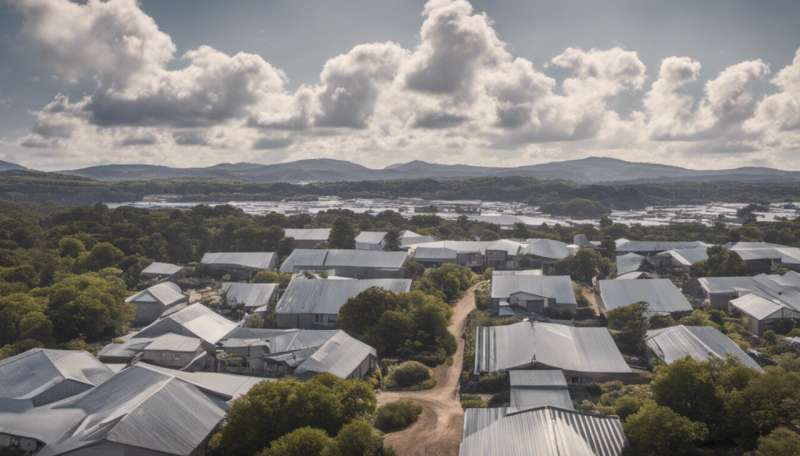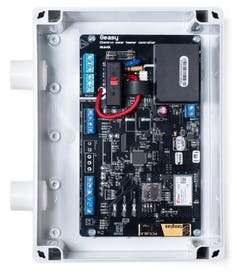Smart water heating could help in South Africa's energy crisis

South Africa's energy crisis has many dimensions, from political and economic to technical and environmental. Recently, the country's power utility, Eskom, has been generating only about 60% of its capacity and has had to restrict usage to prevent a regional blackout.
Eskom's new chief executive officer has affirmed the importance of demand management to handle the crisis. But his approach of merely "subsidising energy-efficient lightbulbs" won't cut it. The country needs drastic interventions—and the elements of the fourth industrial revolution are available to make this possible. These are: wireless connectivity, the internet of things, big data analysis, machine learning, artificial intelligence and intelligent centralised control.
One of the biggest consumers of energy in South Africa is the electric water heater, or "geyser." The estimated 5.4 million electric water heaters in South African homes and public buildings use around 40 GWh of energy per day, draining more than 4 GW, 12% of operational capacity from the electricity grid at peak times.
What tends to be overlooked is that these water heaters are perfect for storing thermal energy. They absorb electrical energy when heating water, and discharge thermal energy later when the hot water is used, with little loss in between. This makes them well suited for flattening the grid's morning and evening demand peaks. Centrally switching them on during off-peak times would distribute demand for electricity more evenly through the day.
The benefits of scheduling heaters don't stop there though. Our research has shown that the energy they guzzle, and the resulting emissions, can be significantly reduced too by applying optimal scheduling—also see our helpful online calculator.
Two thorny issues compete with demand and energy management in water heating. One is customer satisfaction. The most energy-efficient and demand-optimal water heater is one that is never turned on, but who wants a cold shower?
The other is customer safety. A water heater running at a low temperature can promote the growth of harmful bacteria. We have detected potentially lethal Legionella bacteria in water heaters and downstream pipes, and even in heaters that are set to high temperatures.
What needs to be done
The bulk switching off of water heaters, called "ripple control," has been used to do demand management for decades. But this unidirectional approach is not enough to ensure energy savings, and could lead to unhappy users.

The problem can be overcome using the tools of the fourth industrial revolution. They can reduce the amount of energy that customers use to heat water, and thus the aggregate load on the grid, without sacrificing user satisfaction or encouraging disease. We have demonstrated this in our recently published paper on comfort, peak load and energy.
A network of smart water heaters is required to realise the full benefits of scheduling water heaters. These measure and report water and energy usage, remotely control the heating schedule and temperature of each water heater and can learn the user's behavioural patterns.
Individual water heaters could be switched on and off centrally at times that would distribute demand for electricity more evenly through the day while ensuring optimal energy savings for all. We developed and used such a network in our research and demonstrated the efficacy of such a solution.
By introducing individualised optimal temperature-schedule control, we showed that energy savings ranging from 8% to 18% are realistic. This is without taking into account the additional savings that'll result because unintentional hot water use will be at lower temperatures.
It also excludes the savings achieved through high-resolution smart-meter information leading to behavioural change. Taking these extras into account we observed energy savings of 29%, albeit in a small sample.
The ripple effect
This technology has the potential to curb South Africa's costly diesel habit, reduce the country's CO₂ footprint and reduce the triggering threshold for rolling blackouts by at least 2 GW.
Also, with the increased introduction of and dependence on unpredictable solar and wind power, a network of delay-tolerant smart water heaters could help stabilize the grid.
Insurers are likely to play intermediaries between the user and the utility, since smart water heaters limit damage that results from mechanical failures. With thousands of heaters under their control, they could then sell large-scale demand management as a service to the struggling utility, while providing a value-add service to customers. What's more, retrofitting existing water heaters will create jobs for installers and stimulate local manufacturing. Given the multidimensional impact of blackouts, all new water heaters should be smart from the outset.
This article is republished from The Conversation under a Creative Commons license. Read the original article.![]()


















